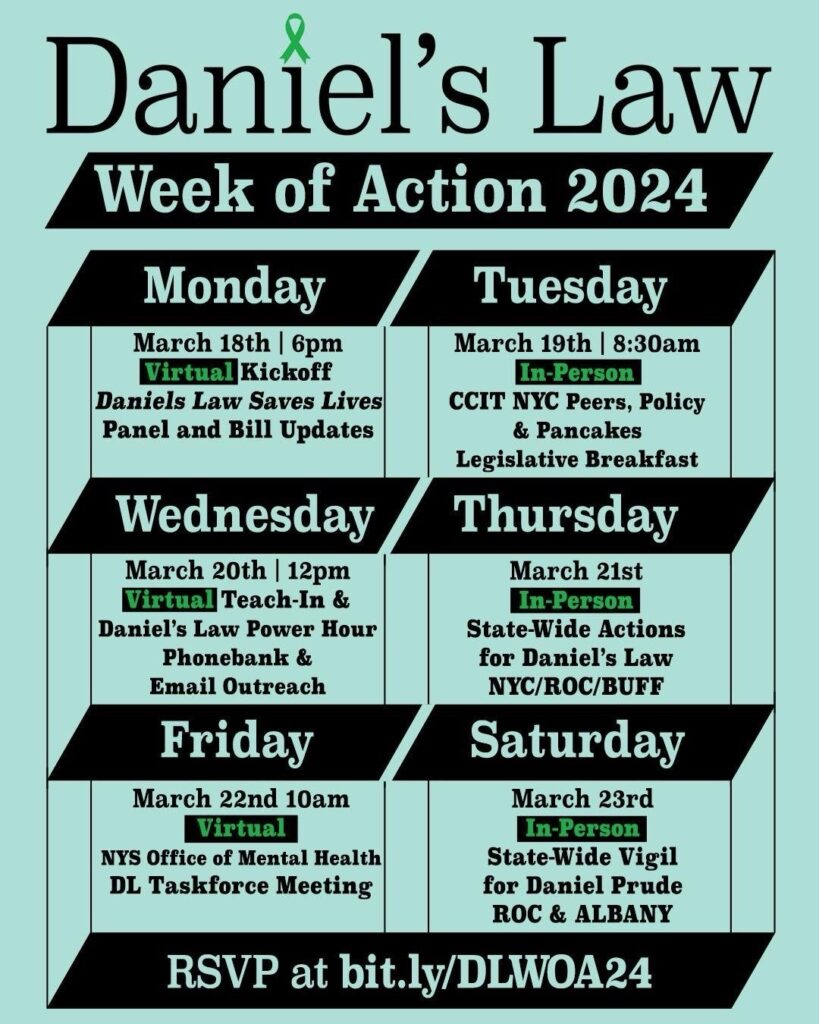Alliance Note: We continue to push for funding for Daniel’s Law First Responder pilots in the final budget as negotiations between the legislature and Governor progress. New York needs these pilots to gain more understanding of how best to implement teams of well-trained Peers and EMTs as first responders to mental health and substance use crisis calls which do not involve violence or weapons. These teams are not meant to replace police, but rather to be the primary responders to crisis calls where police presence is not necessary. Like the CAHOOTS model in Oregon which very rarely requires police assistance, the teams can utilize police if public safety concerns arise. The goal of Daniel’s Law is to reduce the use of police to address what is fundamentally a public health issue.
Join our push to ensure pilot funding is in the enacted budget by sending messages to your lawmakers calling for their support. Use the link below to send messages.
Contact The Governor and Your Legislators Here!
You can also join us for events as we continue the Daniel’s Law Week of Action today (register here). See below to learn more about the proposed pilot funding and see this week’s upcoming events.

Funding Moves Forward for a Pilot Program Related to Daniel’s Law
By Randy Gorbman | WXXI News | March 18, 2024
Local state lawmakers sound hopeful about the upcoming state budget providing funding that will help change the way first responders deal with people having a mental health crisis.
New York State Senator Samra Brouk and Assemblymember Harry Bronson, both Rochester area Democrats, have been advocating for Daniel’s Law. That’s legislation proposed as a follow-up to the death of Daniel Prude four years ago. He died after being restrained by Rochester Police during a mental health crisis.
Bronson said that as negotiations on a new state budget continue, both the one-house budgets agreed on by the Senate and Assembly include $2 million for a pilot program that supporters hope will eventually lead to the passage of Daniel’s Law.
He said the idea is to explore how such a program could lead to a different way of responding to these types of situations.
“A statewide system that is using mental health professionals, peer individuals and peer-led in our responses, and that the focus really is how do we get the individual out of the immediate crisis into more long-term care,” said Bronson.
The city of Rochester and Monroe County already have programs in place that are trying to provide a response of counselors or social workers when police get calls about someone in a mental health crisis. Bronson said if this pilot program gets final approval, it would likely seek to work with any existing programs.
A longtime advocate on this issue, Ruth Lowenkron of the organization New York Lawyers for the Public Interest, said that group has been involved in advocating for Daniel’s Law, and also on behalf of changes that would affect the way police respond to similar incidents in New York City.
Lowenkron said that peers, individuals with “lived mental health experience” are the right people to respond to these types of incidents.
She said that there are times police should be called in, but only in specific circumstances.
“On the rare occasion, that what was called a mental health crisis, (and) is what I call a ‘mental health crisis-plus,’ that it also has a public safety element, someone is threatening imminent harm to someone else, wielding a weapon or the like, that’s when police can be called in,” said Lowenkron.
But Lowenkron adds that even in those instances when law enforcement responds, they would need to be joined by a ‘non-police’ team to help deescalate the situation.
Assemblymember Bronson sounded hopeful about getting the $2 million for the pilot program in the final state budget, saying that it is significant that Sen. Brouk was able to get the measure in the State Senate one-house bill (as well as his efforts to get it approved in the Assembly budget bill).
The final state budget is due by April 1, although that date often slips a bit, and negotiations on the spending plan continue.
There is also a task force that has been doing work on the proposal for Daniel’s Law, and that report is due by the end of 2025.
Funding moves forward for a pilot program related to Daniel’s Law | WXXI News